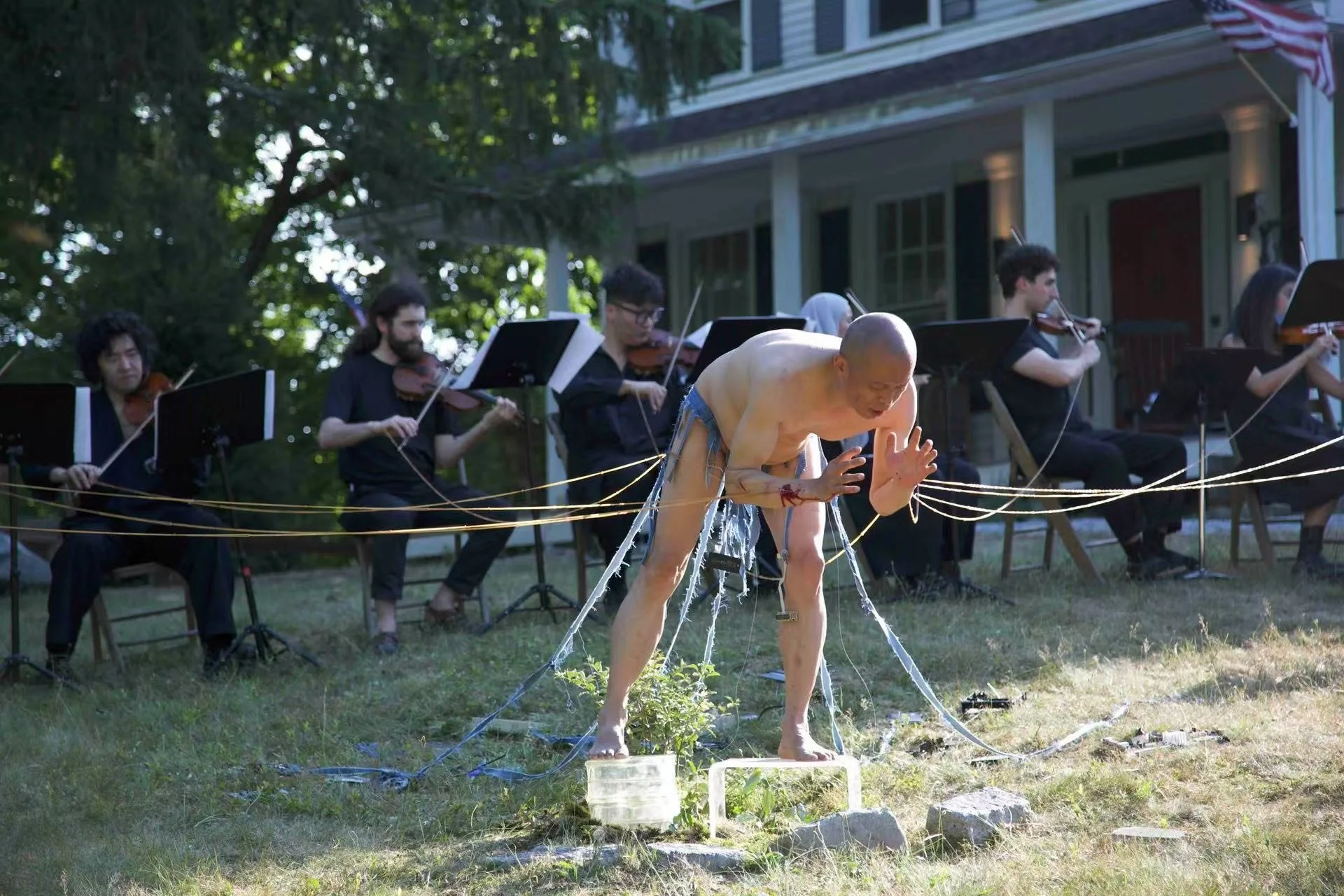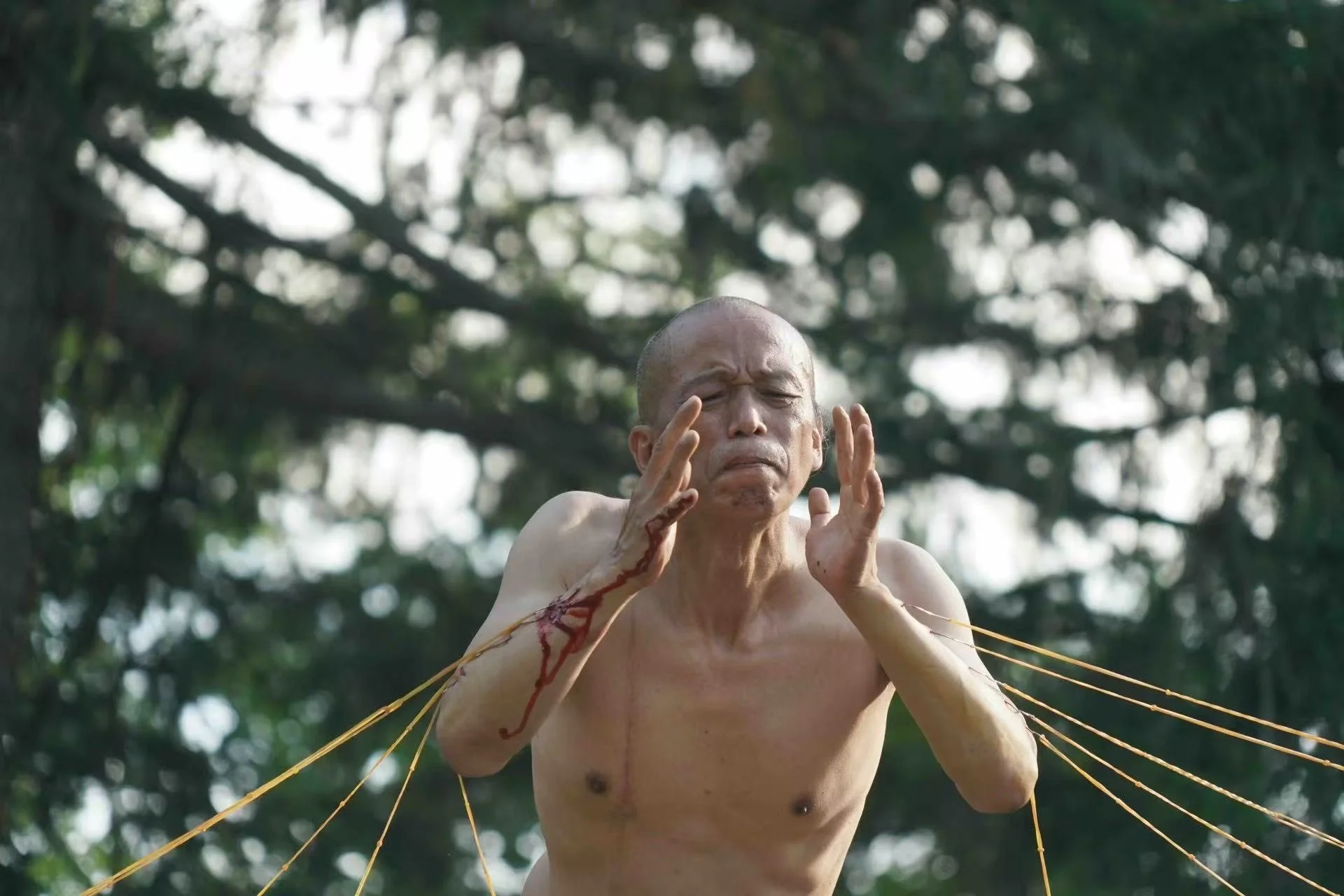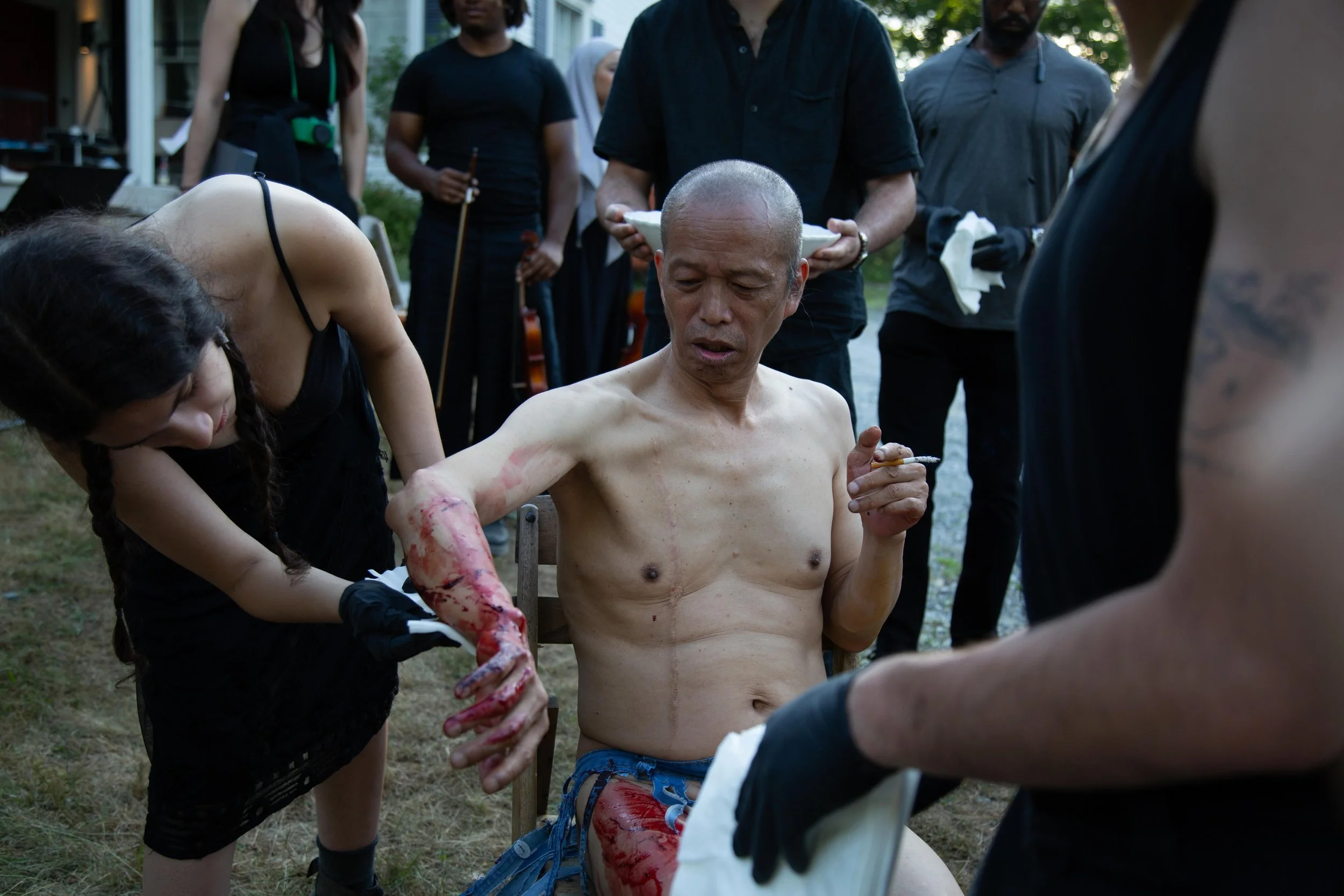Work Without End: “Sabriel’s Consolation”
He Yunchang endures pain with grace and does so frequently. In One Meter of Democracy (2010), he invited 25 people to vote on whether a surgeon would make a centimeter-deep incision from his collar bone to his knee. When the motion carried (the poll being twelve to ten, with three abstentions), constituents watched as He underwent the agonising procedure without anaesthetic. For One Rib (2008), he had his eighth left rib surgically removed. But He’s work is not always so bloody: for The Tenth Generation (2012), he lived outside for 28 days, waiting for the grass to grow in Caochangdi. He has a particular willingness to employ his body as medium, certainly, and if his project is best served by his enduring bodily torture, so it shall be. But suffering is never the sole purpose of these pieces, which he terms “现场艺术” (live art) in order to distinguish from the implication of spectacle vested in the term “performance.” In his most recent live artwork, presence took primacy over pain tolerance.
Sabriel’s Consolation (July 19, 2025) stopped time the way a sunshower does: the sublime bewilderment of unexpected light. It began with an accumulation of curious preparations. At a large table, Meztli Asmussen and Saam Shojaie held He still, while Darkell White laced barbed fishhooks through his arms. Colton Karpman daisy-chained rubber bands that would soon tether violinists’ bows to the freshly embedded hooks. The piercing table was carried away, and He undressed, exposing long scars from One Rib and One Meter of Democracy. Twelve music stands were positioned in a curve on the grass lawn; glass blocks on which He would stand were placed at the arc’s center. A crowd gathered, among whom some observed this frenzy of peculiar activity, but a great many more found themselves participating in it. He’s donning and swiftly casting off a crown of flowers and wire fashioned by Homa Shojaie signified a beginning in medias res, after which He made gestures of embrace, consoling the “souls of those lost in every major disaster” for over an hour.
“Every major disaster.” What could be more brutally honest than this astonishing vagueness? In the summer of 2025, any attempted list of ongoing grave injustices would be incomplete, and such a misguided essay would remove the possibility of engaging with the emotional reality of any given atrocity. Instead, as the players tugged at and bled his outstretched arms, He’s countenance and attitude brought us into a continually renewing present: here we are,now; now; now; now; now—
Consolation refuses resignation and prefaces hope; it is by definition an act of persistence. Persistence and patience have long been among He’s primary working materials, but the relative feasibility of the task to which he applies them has been a point of significant variation over his career. His earliest works—including An Appointment with Tomorrow (1998), in which he spent an hour dialing random numbers into a disconnected telephone, and Dialogue with Water (1999), in which he hung upside down from a crane, attempting to split Yunnan’s Liang River with a knife—direct persistence toward explicitly futile pursuits. Futility was so much He’s concern in these years that a 2008 article dubs him our “contemporary Sisyphus.” More recent pieces, however, marshal the same virtues to more possible ends. In works like the aforementioned Tenth Generation, or Fruits of Longevity (2016)—in which he dry fasted for 72 hours, waiting for 500 kilograms of peanuts to sprout—patience and persistence are not for naught. The grass will grow; the peanuts will sprout. Considered amidst He’s wider oeuvre, Sabriel’s Consolation formulates the question: Is consolation, today, even possible?
Of the work’s twelve violinists, half (bows tethered to fishhooks in He’s right arm) were professionals, tasked in earnest with scoring the performance. The rest (bows tied to hooks in his left) were stand-ins who mimed playing, leaving their tethers comparably slack. Later, cleaning He’s wounds, I was struck by just how much more profusely his right arm bled as a result of this split. That I found myself cleaning He’s wounds goes some way to articulate the extent to which Sabriel’s Consolation involved all present, at every stage of the piece.
This was not achieved through any explicit request for audience participation, but by creating an atmosphere that invited one to notice where one might be of use. The lack of a common language amplified this call for subtle attention. Mandarin speakers, including Lu Gao and Billy Chen, served as translators for a handful of crucial exchanges, but, for the most part, communication on-site happened in the trading of purposeful glances (and of tobacco—He smokes prolifically and bestows cigarettes openhandedly). That the piece implicated its audience so constituted an opportunity to practice careful, attentive presence. This is what consolation, if it be possible, will require.
When atrocity abounds and is delivered to us in the wave-upon-wave manner of the social internet, one sinks easily into apathy or despair. In such a withered moral landscape as our own, one does not go about recommending consolation lightly. But standing naked under the July sun, He Yunchang enacted a double surprise: The familiar shock of bloodshed gave way to a greater overturning of expectation, as the artist shared a persuasive vision of consolation for our calamitous contemporary moment.
Discussing Sabriel’s Consolation this autumn, He is quick to express gratitude to everyone who was present for the piece and emphasizes his concern for the innocent victims of our many concurrent global crises. “We must hold them in our care,” he says in a definitive present tense. Consolation is a work without end.
Sabriel’s Consolation took place on the lawn in front of the House on the Hill at Arts Letters & Numbers in Averill Park, NY, on July 19, 2025. At nearly 40 names long, the full credits list includes everyone who lent an impromptu hand, from volunteer mime-violinists to the person who carried a folding chair across the lawn for He to sit on. A film of the piece is forthcoming. Translations from quotations originally in Mandarin are by Lu Gao.




